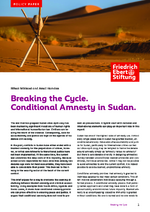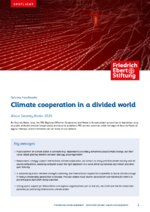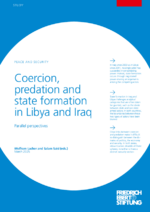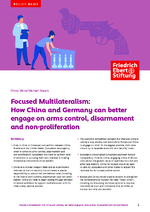Shaping a Just World
Five Suggestions for Africa Policy after the German Federal Elections
Publikation | NewsThe new German government will find itself in the unaccustomed position of leading Europe’s policy towards Africa. In this new paper Henrik Maihack puts forward five...
Read more
International Women's Day: Not only part of the conversation, but leading the way
Displacement, Migration, Integration | Migration policy | Gender Weltweit“Women have been at the forefront of the struggle […] and turned into leaders.”, says Sana Mustafa. Why Syrian women are critical for the future of the country.
...
Read more
The way out of the crisis: a strong social Europe
Politik für EuropaThe future of Europe is at stake, but does Europe have a chance to emerge stronger from this situation? A joint series of articles in cooperation with Social Europe...
Read moreStudy: The radical right’s international networks
What are the driving forces behind the rise of right-wing movements, and what can progressive forces do to counter them? An analysis of the strategies of international...
Read more
Publications
Saka, Luqman
Citizens and security sector reform in Gambiaʿs democratic transition
Dakar-Fann, 2025
Download (PDF) (100 KB, PDF-File)
Mikkawi, Rifaat; Hamdan, Amal
Breaking the Cycle
Bonn, 2025
Download (PDF) (300 KB, PDF-File)
Kaschowitz, Sabrina
Climate cooperation in a divided world
Download (PDF) (1 MB, PDF-File)
Coercion, predation and state formation in Libya and Iraq
LaMarsa, 2025
Download (PDF) (820 KB, PDF-File)
Meier, Oliver; Staack, Michael
Focused Multilateralism
Bonn, 2025
Download (PDF) (170 KB, PDF-File)
Shaping a Just World – Implementing the 2030 Agenda
In September 2015, the United Nations adopted the 2030 Agenda for Sustainable Development. This global plan of action combines human development and the fight against poverty with ecological transformation, sustainable economic development, peace, and international cooperation. The 2030 Agenda's adoption is a historic event.
The 2030 Agenda's 17 Sustainable Development Goals (SDGs) offer a guideline for a just set of policies that take the welfare of all humans into account – on the national and international level, in the Global South and Global North. The Goals outlined in the 2030 Agenda are closely linked. If, for instance, the international community manages to drastically reduce inequality but does not implement ambitious measures to mitigate the effects of climate change, then future generations' life and development chances remain under threat. For this reason, as a progressive political foundation, the Friedrich-Ebert-Stiftung (FES) is committed to realizing the 2030 Agenda's goals in a socially just and comprehensive way – worldwide.
With our work on the subjects of Peace and Security; Climate Change, Energy and Environment; Global Economy and Corporate Responsibility; and International Community and Global Forums, we want to promote the implementation of the 2030 Agenda.
Peace and Security
Our commitment to Peace and Security is based on the conviction that democratic institutions and an ambitious disarmament policy will lead the way to permanent peace. Violence is not a solution; rather, it destroys societies' development perspectives. We promote civil conflict management in order to bring all parties to the negotiating table early on. At the same time, it is vital to push for global arms control. On the national level, all security sector institutions such as police and armed forces must be under democratic control.
For this area, Goal 16 of the 2030 Agenda is especially pertinent to our work. It demands to: “Promote peaceful and inclusive societies for sustainable development, provide access to justice for all and build effective, accountable and inclusive institutions at all levels.”
Climate Change, Energy and Environment
In order to combat Climate Change and its effects, our economic systems need to be changed fundamentally into ones that are actually sustainable. This ecological transformation can only be successful if it is both socially responsible and inclusive. For instance, there needs to be a just transition for employees from the fossil fuel industries, an endeavor the FES, together with trade unions, is developing concepts for. In addition, we are working to ensure that decision-makers take climate change adaptation policies into account that were developed by local initiatives and grassroots activists. With our efforts in the field of climate change and energy policy, we are heeding the 2030 Agenda's Goal 13 call to “take urgent action to combat climate change and its impacts”. At the same time, we want to “promote sustained, inclusive and sustainable economic growth, full and productive employment and decent work for all”, in accordance with Goal 8.
Global Economy and Corporate Responsibility
With the 2030 Agenda, the international community has given itself a set of guidelines for shaping the global economy in the future: One person's prosperity should not come at another person's expense, or at the expense of coming generations. Future economic action needs to be guided by sustainability and the common good.
By strengthening debates on and concepts for a global economy that serves the common good, we want to make a contribution towards reaching the 10th Goal of the 2030 Agenda, namely reducing global inequality. Further, we are working towards establishing sustainable consumption and production patterns, as laid down in Goal 12. And all this is inseparable from Goal 8's demand for decent work for all.
International Community and Civil Society
If it wants to reach the Sustainable Development Goals, the global community needs to show more solidarity with each other. In this regard, we place the onus on the Global North and support representatives of the Global South in presenting their positions; united for justice and against the interests of the powerful, if need be. Further, the FES is committed to helping civil society initiatives that critically review the implementation of the 2030 Agenda and remind rich states of their responsibilities.
Together, all this makes up our contribution towards strengthening global partnerships, as the 2030 Agenda's Goal 17 demands.




